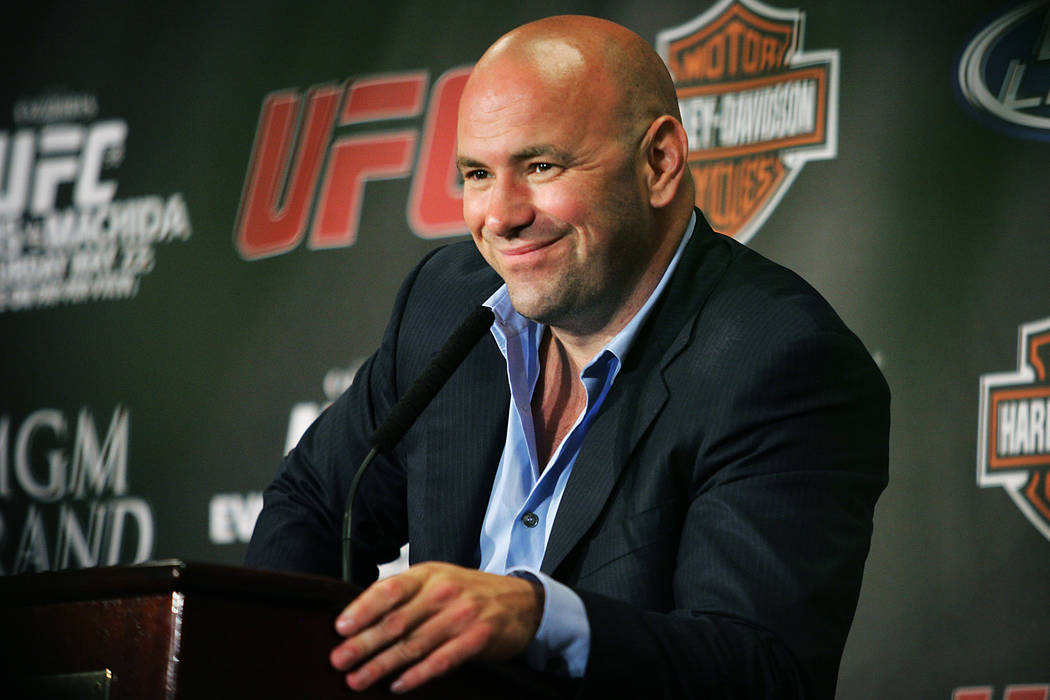Dana White says deal with ESPN will take UFC to ‘next level’
Dana White sometimes speaks in code when describing Las Vegas. “This is a town with some serious FOMO,” says the president of the hugely successful Ultimate Fighting Championship. “You know what FOMO is?”
FOMO? No.
“It means, Fear Of Missing Out,” White says. “The FOMO in this town is through the roof.”
White originally inspired the fear of missing out with his organization’s events, which exploded soon after he took over as president and Lorenzo and Frank Fertitta III took over the organization in 2001. The Vegas Golden Knights have become the city’s can’t-miss sports entity, and the Raiders are already sensing acute FOMO, too.
“If you didn’t jump into the whole Golden Knights thing at the start, you couldn’t get a ticket by the time they made the playoffs,” White says.” People are saying, ‘I’m not going to let that happen to me when the Raiders come.’ ”
White’s company bought a VIP suite at Raiders Stadium when they originally were offered, spending $6 million for a 15-year lease. The boxes are now sold out, and they went at far higher prices later. “I could make millions if I sold mine now,” says White.
White watches the sports explosion, which also includes the first year of the WNBA’s Las Vegas Aces at Mandalay Bay Events Center, from a unique perch. He’s a fan, of course — one who was shown on the video screen shouting, “Make some noise!” to rev up Golden Knights fans at T-Mobile Arena. But as a longtime sports executive, he sees parallels between the UFC’s early success and what followed.
“The Golden Knights are much like the UFC in the sense that, when the UFC started in Las Vegas, there were not a lot of believers,” White says. “A hockey team in Vegas? Come on. It’s not a sports town. People won’t show up for it.’ But the UFC was the city’s original sports team, and we heard a lot of that, too.”
As White elaborates, the UFC had a three-person office — including him, at the top — when it began operating in Las Vegas in 2001.
“Early on, it was hard to get good talent to move to Las Vegas,” he says. “We built a huge facility, but all the production guys and sales guys, all wanted to be in L.A. and New York. …The landscape has changed. Now everyone wants to come to Las Vegas.”
The new UFC corporate headquarters is evidence of the company’s evolution.
The state-of-the-art complex, between Jones and Rainbow boulevards, houses all of the company’s offices and training facilities. A multimillion dollar, 30,000-square-foot Performance Institute is outfitted with a boxing ring and mixed-martial arts cage for sparring and training sessions, an indoor and outdoor track for endurance work, and the latest tools for rehabilitation.
The UFC is also the anchor tenant in another palatial Vegas venue, T-Mobile Arena. In March 2017, venue operators AEG and MGM Resorts International signed the fight company in an exclusive Las Vegas arena partnership. The UFC is to hold four fight cards per year at T-Mobile and present promotional signage in and around the arena, year-round.
Construction on the headquarters began while the UFC was still owned by Station Casino co-owners Lorenzo and Frank Fertitta III. In July 2016, the brothers sold to Hollywood investment company WME-IMG for $4 billion in what Forbes magazine said was “considered the largest transaction in professional sports history.” The Fertittas paid $2 million when they bought the company in 2001. White has remained in charge of the UFC’s day-to-day operations.
UFC also has signed a five-year agreement with ESPN (to take effect in January) for the network to air 42 live events per year across ESPN and ESPN Plus.
ESPN, a company that originally was reluctant to cover UFC, is now spending $1.5 billion to replace Fox Sports as the company’s exclusive digital and linear distributor of UFC events in the U.S.
“The deal with ESPN will take the sport to the next level,” White says. “We’re becoming a global brand, and we’re able to deliver the sport to different countries — Russia, China and Brazil. We’re going to different countries to put on the biggest fights in the world.”
The UFC’s first fight card is set for Moscow on Sept. 15. The next weekend, the company hosts a UFC Fight Night card in San Paulo, Brazil. Its debut in mainland China, in Shanghai, was last November.
The UFC is not the first combat sports organization to be headquartered in Las Vegas, of course. Legendary promoter Bob Arum’s Top Rank Boxing has been headquartered in the city since the early 1970s. But UFC is run more like a league, in full control of the events it promotes and stages. The organization ensures that the top fighters meet each other in a timely manner. The UFC title-fight schedule is organized in the same way the NFL and NHL align their teams for ongoing competitive balance.
“We make sure that the best fight the best,” White says. “We’re not as fragmented and as broken as boxing is. We keep our events in competitive alignment, absolutely.”
White recalls when he was a kid, many top entertainment acts did not want to perform in Las Vegas. “In the ‘80s, the town had a reputation as the place you played if you were washed up,” he says.
Now, White says, “All the biggest acts come to Vegas. The UFC is here, the Golden Knights are here, the Raiders are coming. The Aces might lead to an NBA team someday. We’ve transformed into a real community.”
And if you think the city has FOMO now, just wait a few years.
More MMA: Follow all of our MMA and UFC coverage online at CoveringTheCage.com and @CoveringTheCage on Twitter.
Contact John Katsilometes at jkatsilometes@reviewjournal.com. Follow him at @johnnykats on Twitter and @JohnnyKats1 on Instagram.


















